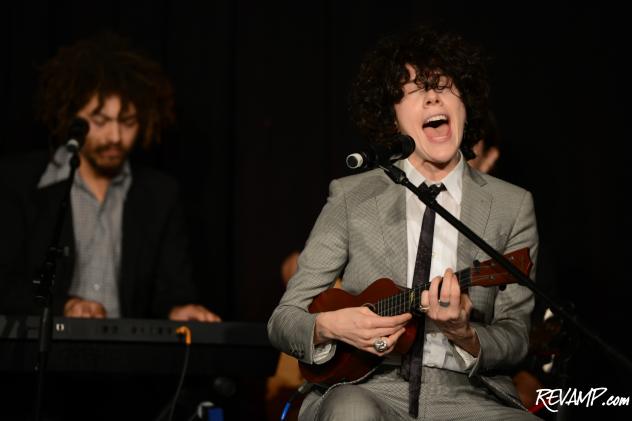|
| News >> Story |
Music Matters To Hill; Singer/Songwriter LP Whistles Happy Tune During Digital Age Discussion w/ Spotify, Vevo, RIAA, WBR ExecsBy Daniel Swartz on September 12, 2013
CAPITOL HILL -- Few industries felt the seismic impact of the rise of the so-called digital economy more than that of the U.S. music industry. While U.S. music industry revenues from digital formats continue to grow, up 14.0% versus the prior year after crossing the 50% threshold for the first time in 2011, digital music theft has been a major factor behind the overall market decline.
 Whether attributable to such rampant piracy on the Internet or declining interest in purchasing full-length albums, the resulting loss of billions of dollars in revenue has dramatically altered the way music is created, nurtured, marketed, consumed, and, yes, sold today.  To be sure, all news is not dire. From the ashes of the industry's first brush with the Internet has risen a new batch of music companies, with each striving to cobble together a new business plan for the digital age.  But the rules have changed dramatically since the '90s, new business models pervade, and content which once used to be given away for free now comes at a price (regardless of whether the end listener actually has to open his/her wallet).  As a longtime nation of innovators and one where intellectual property (e.g., songs, movies, software, etc.) accounts for 60% of all exports or 34.8% of GDP, the United States clearly has a vested interest in supporting and protecting such newly revitalized music industry initiatives.  And that was how Ken Parks (Chief Content Officer, Spotify), Rio Caraeff (President & CEO, Vevo), Cary Sherman (Charman & CEO, Recording Industry Association of America), and Rob Cavallo (Chairman, Warner Bros. Records) found themselves on Capitol Hill this week, for a special discussion on "how music is driving innovation and artists are making their mark in the new digital marketplace."  Part of the RIAA's Music Matters awareness campaign, Tuesday afternoon's event had lawmakers, Hill staffers, and even members of the general public crowding into one of the Rayburn Building's private meeting rooms, for the opportunity to learn more about the music industry's changing dynamics.  Subscription rates, piracy statistics, and legislative agendas aside, the tone of the room became remarkably more energized once Cavallo took to the front of the room and proceeded to entertain guests with various "war stories" from the A&R trenches. The D.C. native is best known for signing punk rockers Green Day, although he has also produced records for everyone from Fleetwood Mac to Adam Lambert to Avril Lavigne to the Goo Goo Dolls. Perhaps the biggest draw to Tuesday afternoon's gathering, however, was a special musical performance by hit songwriter/singer LP (born Laura Pergolizzi). Audience members, who gave the artist a standing ovation at the abridged concert's conclusion, were treated to a preview of her upcoming major-label debut album (she returns to D.C. at the 9:30 Club on October 16th).  Digital or stone ages, the demand for music has never been stronger after all.
Tags:Rayburn House Office Building
|
 |
Copyright © 2008-2018 Revamped Media, Inc. All rights reserved. |







